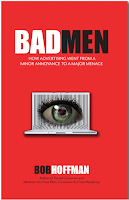Last night I had the good fortune to be invited to the "world premiere" of the movie Moneyball. It's a terrific film. If you like baseball, you'll love it. Even if you don't like baseball, I think you'll enjoy it. In July of 2008, I wrote a post about the book Moneyball. I thought I'd reprint it today.
The best book I ever read about advertising wasn't about advertising. It was about baseball.
It was called Moneyball, by Michael Lewis. If you are in marketing or advertising you should read this book.
The premise of the book is that baseball insiders are guilty of a herd mentality that is focused on the wrong things and reaches the wrong conclusions.
The book is centered on Billy Beane, general manager of the Oakland A's. The A's have one of the lowest payrolls in baseball, and yet, have won more regular season baseball games since 2002 than any team other than the Yankees.
How they do this is by ignoring all the conventional wisdom (i.e., bullshit) that permeates their business. They have developed their own principles about what makes a ballplayer valuable. And they follow these principles regardless of what the herd thinks.
As I read the book I marveled at the parallels to advertising.
There is an ossified aristocracy of advertising insiders -- just pick up any issue of Ad Age or Adweek to find out who they are -- who keep repeating the same dreadful cliches about "engagement" and "conversations" and "media neutrality" and "360 degree touchpoints" and "surprise and delight" and "disruption" and "integration"... ad nauseum. And the herd follows.
The hard part is getting beyond the mind-numbing double-talk of the trend-setters and developing your own principles. And here's a tip -- if you can't express it plain English, it's not a principle. It's jargon.
I bought a copy of Moneyball for each of our managers and gave them an assignment to read it. We examined what we really believed about advertising and put it down in writing. This lead us to create 3 guiding principles by which we create advertising. We may not be the smartest people in the world, but at least we know what we do and why we do it. And it's different from anyone else we know.
I highly recommend this book and this exercise.
September 20, 2011
Subscribe to:
Post Comments (Atom)





No comments:
Post a Comment